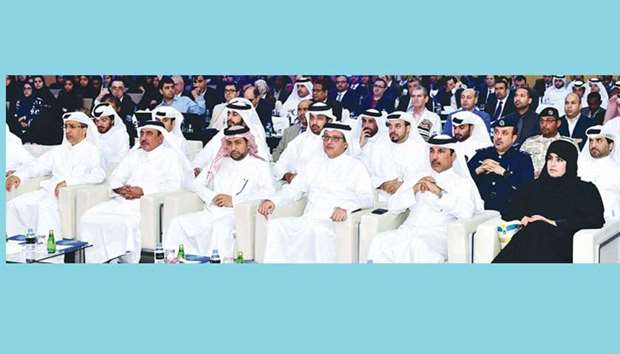Qatar University (QU) yesterday launched an international conference on ‘Law and Digital Age’, organised under the patronage and in the presence of HE the Minister of Transport and Communications Jassim Seif Ahmed al-Sulaiti.
Organised by QU colleges of Law (LAWC) and Engineering (CENG) and sponsored by Ooredoo Qatar, the two-day event aims to highlight the fast development and legal challenges in the field of digital technology and find ways to develop the country’s legal system, QU said in a statement.
The conference also aims to underline the effectiveness of legal regulations to solve these issues and challenges and the necessity to propose legislative and technical approaches that keep up with the fast technological and technical developments in the area of information and communications technology.
Attending the opening ceremony were HE al-Sulaiti, HE the Minister of Justice Dr Hassan Lahdan Saqr al-Mohannadi, QU president Dr Hassan al-Derham, LAWC dean Dr Mohamed Abdulaziz al-Khulaifi, CENG dean Dr Khalifa al-Khalifa, Ooredoo Qatar chief new business officer Sheikh Nasser bin Hamad bin Nasser al-Thani, QU officials, as well as LAWC and CENG faculty, students and staff.
The programme agenda featured five panel sessions titled ‘Novelties related to electronic transactions’, ‘Rights related to the digital world’, ‘Contemporary trends on counter-cyber terrorism and cyber security’, ‘Data protection and privacy in the digital age’, and ‘Electronic means of dispute settlement’.
It also included numerous presentations by speakers from QU, Ecole Normale Supérieure, International Islamic University Malaysia, International & Government Engagement Division Cybersecurity Malaysia, Indian Society of International Law, Ital-IoT Centre for Multidisciplinary Research on the Internet of Things, Nexa Centre for Internet and Society, Northumbria University, Police College Qatar, Purdue University, Sultan Qaboos University, Supreme Court of India, The Australian National University, The Chinese University of Hong Kong — Faculty of Law, TUBITAK BILGEM,, University of New South Wales Faculty of Law, and University Yahia Fares Medea.
Discussions focused on a wide range of issues, such as ‘Smart Economy: Blockchain and Cryptocurrencies’, ‘Specificities of contracting via electronic means of communications – Analytical study in the light of the Qatari decree-law No 16 for the year 2010 on transactions and electronic commerce’, ‘The Legal Framework for International Electronic Contracts’, ‘Cyber Security Capabilities Malaysian Perspective’, ‘Property Ownership: Towards a Legal Personhood of Artificial Intelligence’, ‘Cyber Security Trends and Solutions’, ‘Criminal protection of the personal data privacy processed electronically – Analytical comparative study’, and more.
In his remarks, Dr al-Derham said: “The university continues in its efforts to provide solutions to the society’s issues and challenges.
“The latest situation has shown QU’s commitment to solve the challenges facing the society through scientific and methodical criteria and to provide its students and the various sectors of society with the necessary support.
Additionally, the university offered sustainable solutions to overcome the negative impact of the crisis.
His Highness the Emir Sheikh Tamim bin Hamad al-Thani stated in his speech last July: ‘this crisis has driven Qatari society not only to explore its human values as I have indicated, but also to draw on its sources of strength that lie in its unity, will and determination’.
“This timely conference highlights numerous issues that are of the interest of society such as the contemporary trends to combat cyberterrorism and promote cybersecurity, the rights of digital age, privacy protection and electronic means in conflicts resolution. We look forward to the vibrant discussions and recommendations that will emanate from the conference’s sessions.”
Dr al-Khulaifi noted, “Through organising this conference, the colleges of Law and Engineering reveal the correlation between engineering and law as the design of digital applications and the usage of electronic devices are at the heart of engineering sciences, and their usage and activities are subject to the rules of regular assets that are addressed by legal sciences.”
Sheikh Nasser added, “With the electronic threats faced by various institutions across the world, cyber security has become an important priority for the institutions working in the field of law and other areas. Hence, institutions need more than ever to strengthen their information security systems.”

HE Jassim Seif Ahmed al-Sulaiti, HE Dr Hassan Lahdan Saqr al-Mohannadi, Dr Hassan al-Derham and other dignitaries at the opening session of the conference yesterday.
